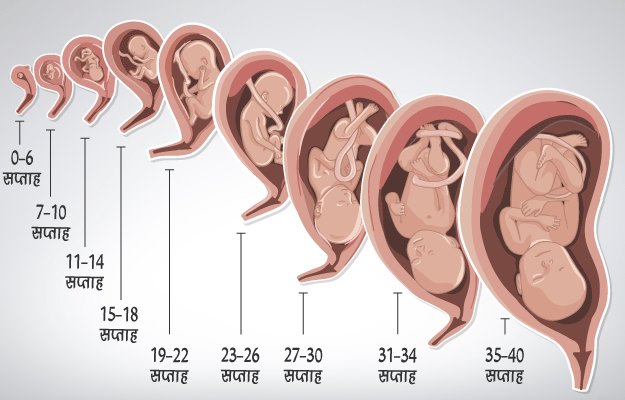Pregnancy 9th Week
You have now entered the ninth week of pregnancy, and are probably noticing some changes in your body. Maybe your clothes don’t fit you as well as they did before, or your hormone levels are making you moody and irritable. But the one thing you need to remember as your pregnancy develops is that all these changes show that your baby is thriving, and that you need to take better care of yourself so that your bundle of joy arrives safely and in good health.
A lot is happening during the ninth week of pregnancy, so you might have a lot of questions. Here is everything you need to know about your body and your baby during the ninth week of pregnancy.
What does your baby look like now?
Your baby is 22mm long, roughly the size of a strawberry. Yes, that might still feel like the baby is small, but this is the stage when he/she is growing rapidly.
To recap: by week 8, your baby’s eyes, nose, upper lip, arms, legs and eyes had started to develop and his/her tummy and neck were starting to look more upright. You might have already heard his/her heartbeat during an ultrasound in week 8. These rapid developments will continue, as you complete two months of your pregnancy at the end of this week.
Here’s what you can look forward to this week: by now, the embryonic tail is completely gone and rapid weight gain is now happening. Your baby looks more like a human now. This is more so because the rapid development of joints - knees, shoulders, ankles and wrists. Your baby is now able to move freely within the amniotic sack, and is possibly even forming a fist and sucking on his or her thumb!
The eyelids have also formed completely, even though they are fused shut. They will open during the 28th week. The eyes are bigger already, and will show signs of pigmentation (even though the final colour of your baby’s eyes will develop when he or she is three years old). Your baby’s heart is also growing rapidly now. It starts beating on the 24th day of conception, but now it’s developing into a full-fledged organ with four chambers and valves.
What’s happening to your body?
You might not be showing a baby bump yet, but a lot is changing in your body. Your breasts are getting bigger while preparing for lactation, so it might be the right time to get a more supportive bra. The human chorionic gonadotropin (hCG) hormone level has been shooting up in your body, and it’s at its peak in the ninth week. Just like in the eighth week, your blood volume has increased by half at this stage.
Ninth Week Pregnancy Symptoms
Simply because you are excited about your pregnancy and at the prospect of welcoming a baby into your family does not mean that you are not experiencing discomfort. It’s important to remember that some symptoms, like morning sickness, are quite normal. You just have to understand what’s happening and deal with these signs better. Here are some things you might experience in the ninth week of pregnancy.
Mood swings: Your estrogen and progesterone levels have shot up, and these hormonal changes can affect the neurotransmitters in your brain and, in turn, affect your mood. Pregnancy mood swings can be exacerbated by fatigue and stress, so it’s important to manage these symptoms as well. Get enough rest, eat well, meditate and get some fresh air to manage your mood swings.
Heartburn: That painful, burning sensation in the centre of your chest might feel like a heart attack, but it’s actually happening because your stomach acids have risen up to the esophagus. The best way to deal with heartburn is to eat smaller meals, and avoid greasy or spicy foods.
Sore breasts: Apart from feeling fuller and tender, your breasts can also feel sensitive and hurt. This is because of the rising progesterone levels - breast tenderness is a sign that your body is preparing for lactation after you give birth. Apply a cold compress or take a hot bath, and ask your doctor if you need to take any topical cream to relieve the soreness and pain.
Fatigue: A feeling of tiredness and fatigue is quite normal during this time, especially because your body is pumping a huge amount of blood and your hormone levels are increasing. You might feel more lethargic and sleepy, and the best way to handle this lethargy is to get enough rest, eat healthy and exercise.
Changing tastes: Dysgeusia or a change in your tastebuds is a common symptom at this stage, and you can blame it on your hormones. You might start hating dishes you used to love, and start craving foods that you didn’t and might even get a metallic taste in your mouth. Include plenty of foods rich in vitamin C - like kiwi, guavas, strawberries, rose hip, papayas, lychees, lemons, Brussels sprouts, and capsicum (especially yellow peppers) - in your diet and you will be able to manage this symptom much better.
Vaginal discharge: Some vaginal discharge is quite common during pregnancy, but if this discharge is yellow in colour or starts stinking, then it could be a sign of infection and you should consult your doctor immediately. If you start spotting or you have vaginal bleeding of any kind, then you should take it seriously and visit a doctor immediately.
Dark skin patches: Getting patches of dark skin on your face, or chloasma faciei, is quite normal during pregnancy. It usually goes away after you give birth or are done with breastfeeding, but do refer to your doctor if you are worried about it.
Read more: Home remedies to remove dark spots from the face
Hair growth: Now this is the enjoyable part of estrogen rise in your body. Your hair will feel thicker, longer, more lustrous, and you will observe almost no hair loss. Enjoy this phase and get a haircut now if you want to pamper yourself.
Frequent urination: Thanks to your growing uterus, your bladder will feel constantly pressured and lead to frequent urination.
Bloating and constipation: You’re probably eating an iron-rich diet and taking iron supplements by now. Plus, your body is making a hormone called relaxin to help your uterus stretch to accommodate your growing baby. Relaxin relaxes your intestines and makes digestion a bit sluggish; producing these symptoms. You’re probably also stressing a little. All of these factors can contribute to constipation during pregnancy.
Oily skin: A rise in the androgen hormone can lead to oily skin in a lot of pregnant women. This in turn can lead to acne breakouts. It’s important to drink enough water and eat healthy to deal with this, but you should ask your doctor about topical creams to treat acute acne breakouts. Remember not to self-medicate at any point during your pregnancy.
What can go wrong in the ninth week of pregnancy
You might be taking ample care and getting enough rest during your pregnancy, but there are a few things that can pose a risk.
A miscarriage can happen in the first 20 weeks of the pregnancy, and it can be quite traumatic too. But you need to remember that a miscarriage does not mean that you won’t get pregnant again.
An ectopic pregnancy can happen if the fertilised egg or ovum got attached in the fallopian tubes (or anywhere else) instead of the uterus. It’s very important to get an ectopic pregnancy diagnosed and treated immediately, since it can terminate your pregnancy - the fallopian tubes may also burst, if you are not careful.
Both a miscarriage and an ectopic pregnancy can be quite traumatic, and you must get counselling and support from your family if either happens.
Things you should do in the ninth week of pregnancy
Being prepared for the full term of your pregnancy is very important. Here are a few things you must get done by the end of the ninth week:
Appointment with an obstetrician: Fixing an appointment with your obstetrician is as important as scheduling all the routine checkups you will need throughout your pregnancy. Make sure you give your doctor your full medical history, plus a medical history of your immediate family. And get all the common screenings and tests that he or she recommends - first trimester tests include complete blood count, urine test, ultrasound, Rubella test and Hepatitis B test. This will help your doctor get a more complete picture of the care you and your baby will need to have a successful pregnancy and delivery.
Antenatal classes and support groups: Pregnancy and motherhood are life-changing events, and you will need all the support you can get. Register yourself and your spouse or partner for antenatal classes or join a group (online or locality based) of women who are also new mothers or going through varying stages of pregnancy. This will ensure your mental wellbeing and help you stay stress-free.
Prenatal supplements: All pregnant women are recommended iron and vitamin supplements for the period of their pregnancy to counter the risk of any deficiencies or abnormalities. Depending on the results of your tests and screenings, your doctor might recommend supplements suited to your specific needs. (By now, you would already be taking folic acid tablets. Please continue taking more than 400 micrograms of this vital vitamin B9 daily till the 12th week of pregnancy.)
Exercise: Staying active and fit during your pregnancy can ensure the birth of a happy and healthy baby. But do not start rigorous exercises after you get pregnant if you weren’t doing them before. Light exercises, walking and an active lifestyle should help.
Healthy diet: Increase your folic acid, iron and vitamin intake and make sure that you have smaller and more frequent meals throughout the day. Avoid eating spicy, rich and greasy food and cut off alcohol, tobacco and drugs completely.
Takeaways
Being informed and updated is very important. Reading up, watching videos and talking to experienced mothers and healthcare providers about pregnancy can be an enriching experience - it may also help to calm any nervousness you might have about your symptoms or what to do next.
Stay in touch with your doctor and don’t shy away from asking questions or discussing your symptoms clearly.
Avoiding stress and anxiety during pregnancy is very important. For starters, enlist the support of your spouse, family and friends on this front.
Take ample care of yourself and do not take any medication without consulting your doctor first.







